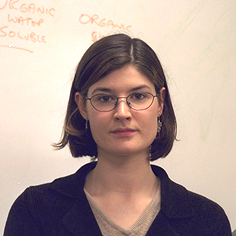Career interview - Electronic engineer
Geraldine is an electronics engineer at Visteon Automotive Systems part of the Ford Motor Company Ltd. A member of their graduate training scheme, she is enjoying placements in different parts of the company.

Geraldine Paxton
Career experiences
"I had slightly dubious ideas that working in industry might be grimy and dirty, but it's not. I get to do a lot of travelling, am well paid and there are lots of benefits, like a cheap car! It is good, especially for a girl. You tend to find everybody is keen to help you to do well. I've not come up against any discrimination."
"In my first year I was given a lot of responsibility. Straight out of college and managing my own little project in the Ford Audio design group, implementing a new tuner into the radio. It was a huge learning curve, working in the lab getting into the guts of the radio, doing measurements, calculations, and optimising responses, using a lot of our computer aided electronics packages."
"We needed to compare the radio performance in various cars, so in Germany we drove a Mercedes and a BMW as well as Fords around the autobahn. I successfully launched that product and went to Portugal where it's manufactured. I should be going to the States or South America at some point to meet engineers in other plants which Ford are planning to standardise."
Geraldine's second placement is in production manufacturing. "It's still mathematical but there's more firefighting to be done. A lot of the data we gather is statistical, using Excel, working out measurables in manufacturing to see how production is going. I like taking problems and solving them. It's probably why I'm in engineering."
"I'm down on the line now with all the equipment. If something happens, you've just got to solve it otherwise the plant closes down. It's a bit hairy but good adrenalin!"
Next will come a business placement in marketing, finance or material buying logistics for a few months, "to give a broad overview of the company". Geraldine wants to be an audio design engineer. "A lot of advances are going to be made in in-car entertainment and I really want to be there."
Student Life
Geraldine did Scottish Highers in Maths, English, Physics, Chemistry and French at the Kyle Academy in Ayr, and a four year honours degree course in Electronic and Electrical Engineering at the University of Strathclyde.

Royal College Building, home of the Department of Electronic and Electrical Engineering, University of Strathclyde. (Copyright: Department of Electronic and Electrical Engineering, University of Strathclyde).
She was brought up with technology. "My Dad was an engineer and always in the back of things and fixing them. He encouraged me. I guess I just picked it up from there. At school I was more interested in solid sciences. I thought about Medicine and Veterinary Science, but I just had this vision of me creating things."
Geraldine says "Maths never fails to amaze me. It's everywhere, whether modelling or simulations for the performance of shares or economic climates, even Engineering is Maths. So is nature, Fibonacci sequences determine pine cone shapes and then you get to Chaos and all that stuff."
"I was never one for essays where you've just to argue your point. In Maths you get a question and you just work through it. When you write it all out and eventually get the answer, there's a real sense of satisfaction. It was like that all the way through my degree course too."
Life at university was "great, making friends and you get a good insight into disciplining yourself. At home you've got your Mum there to drag you out of your bed in the morning, make you do your homework and they do your washing! At university it's a whole new ball game."
"Strathclyde has one of the largest electronic engineering faculties in Europe. It's very advanced with equipment, technology and there's a lot of interest from business."
She would like to see more girls coming into engineering, they made up about 10% on her degree course. "I was involved in WISE (Women in Science and Engineering). We went around the schools in Glasgow encouraging girls into engineering. People applying to university are tending to go for the easy options where they can get a degree. I think if we don't actually encourage people with the brains into engineering Britain's industrial future is going to be shot in the foot."